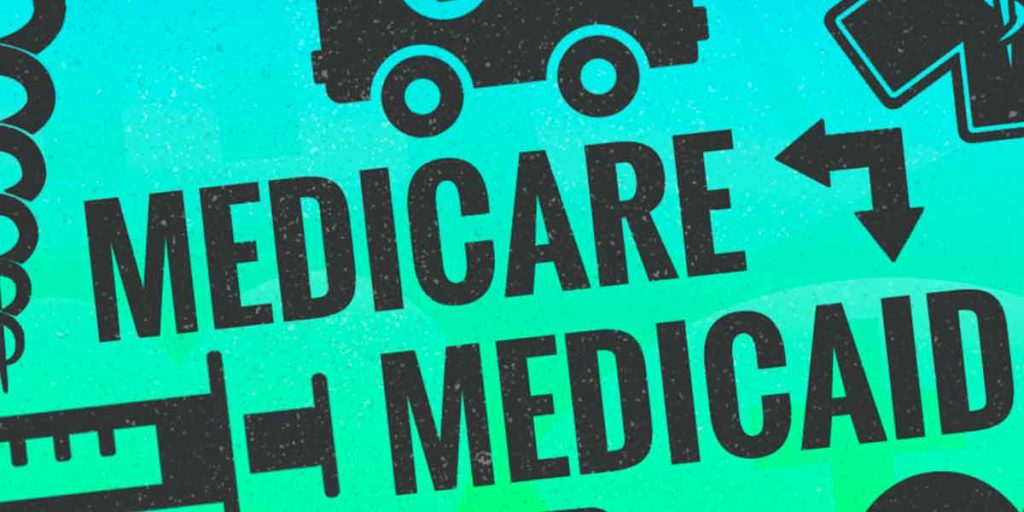Medicare typically caters to seniors above the age of 65 and other disabled individuals. Medicaid, on the other hand, is a program that covers the healthcare cost of long term care for low income Americans who cannot afford the high cost of assisted living.
Notably, Medicaid caters to people of all age unlike Medicare. It caters to children and older adults, each with their own requirements, nonetheless.
Medicare
The social program is made up of four parts as follows:
Part A: Hospitalization coverage
Part A of Medicare covers the cost of staying in the hospital for an individual of 65 years or older. There is no income limit for this benefit. However, eligibility demands that the individual or their spouse must have worked and paid Medicare taxes for up to 10 years. Most people usually don’t pay premiums for part A.
Part B: Medical insurance
Part B covers medical equipment and services for hospitalized individuals. The coverage includes cost of lab work, x-rays, outpatient care and treatment, doctor’s visits, and disease screenings.
Most people who qualify for Part A also qualify for Part B. However, they would need to pay a higher premium for Part B if they earn over $88,000 annually ($176,000 for couples). Deductibles and coinsurance apply.
Part C: Medicare advantage plans
Those eligible for A and B are automatically eligible for part C. However, the benefits here are provided by private companies associated with Medicare. This part offers coverage for vision, hearing, dental and prescription costs.
It is a wise idea to consider whether you will need these services because you may have to pay for such special services from your bank account.
Part D: Prescription drug coverage
Individuals must pay monthly premiums, a yearly deductible, and co-payments to get continued access to prescription drug. Note that Part C also covers prescription drug coverage. So if you have already enrolled in that part, you shouldn’t bother about this part.
Who can apply for Medicaid
- Adults earning below $884 monthly and having an estate worth less than $15,900
- Pregnant women
- Single individuals
- Children below 18
- Someone having blindness or other disability
- Parents and caretakers
- New York residents
- Legal aliens.
- An individual wills huge medical bills
Eligibility for Medicaid is typical determined by your income. If you earn over the limit of $884 monthly with estate worth over $15,900, you may not qualify for Medicaid.
What does Medicaid cover?
Medicaid covers a host of things that border on long term care, whether in a nursing home facility or at home. It covers:
- Doctor visits
- Hospital expenses
- Home health care
- Nursing home costs for long term care.
- Pediatric and family nurse practitioner services, and the likes.
Medicaid does not cover prescription drugs.
Does getting Medicaid affect Medicare?
Getting Medicaid doesn’t affect Medicare in any way. The truth is that Medicaid works with Medicare. It can be seen as an upgrade of Medicare and can help in enhancing your health care benefits.
If you are already enjoying the benefits of Medicare and you are eligible for that of Medicaid, don’t hesitate to apply. Applying for Medicaid even while enjoying the benefits of Medicare will provide you with extra health care benefits.
In fact, there are a lot of reasons why you need to apply for both Medicaid and Medicare and on of them is that, being enrolled in both of these government funded programs will automatically give you access to a Medicare Savings Program (MSP). MSPs pay your Medicare part B premium, and may offer extra help.
Bottom Line
For service covered by Medicare and Medicaid (like doctor’s visits, hospital care, home care, and skilled nursing facility care), Medicare is the main player. Medicaid is the payer or last resort, this means that it often pays last. When you visit a provider or a facility that accepts both forms of insurance, Medicare will pay first and Medicaid may cover your Medicare cost-sharing, including coinsurance and copays.
Get help from an elder law attorney near you
If you have any questions about Medicaid and Medicare eligibility or you need help with the application in New York City, our Queens elder law attorneys can assist you. Call us.









